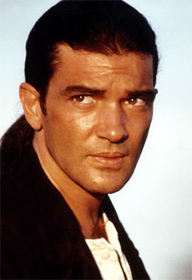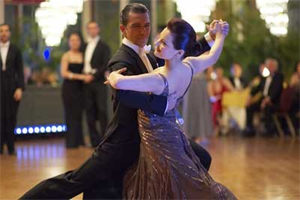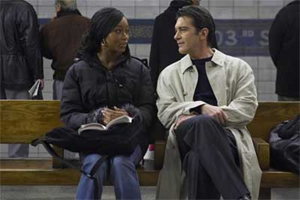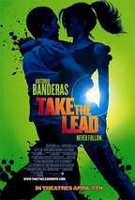Antonio Banderas Take the Lead Interview

by Paul Fischer in Los Angeles.
Paul Fischer: So, you were in the middle of shooting Zorro 2 when this script first made its appearance. Why did you decide you wanted to go from what must have been the most hellish shoot on earth when you did Zorro to dancing?
Antonio Banderas: Actually at the beginning I was not very much into the story. In fact I looked at the script and as soon as I saw that it was about ballroom dancing I put it aside and said, nah, I dont want to do this. But then the producers called me and said could you please give us 20 minutes and well explain to you what were trying to do. So they came and they started talking to me about the figure of Pierre Dulaine and then they showed me a documentary that they had on him and, I loved it. Then when I met him everything changes. I found a guy that was doing things for nothing in return and I thought that it was a very rare animal in our days and, the guy was getting very successful with his program of dancing, and I started getting interested.
Paul Fischer: Now youre a dancer in some ways ---
Antonio Banderas: Yeah, but I am not a dancer. Im an actor who pretends - as I pretend that I swordfight. I pretend I ride horses - but I am not that. [Laughter].
 Paul Fischer: But how much harder was it for you then to get into the mindset of a ballroom dancer?
Paul Fischer: But how much harder was it for you then to get into the mindset of a ballroom dancer?
Antonio Banderas: Well it took I think the right amount of time because I can tell you Im not a dancer, but at the same time I may tell you that I am good with physicality. I can move and can learn fast. Also because of Zorro or Desperado, though you see those movies and say an action movie, they are choreographies too and you have to pick up those choreographies in order to do the movie. So we started rehearsing here in Los Angeles first, with two choreographers. And at the beginning its hard just to pass that kind of discipline moment, but once you cross that discipline moment you fly - really. I discovered in ballroom dancing a world that I didnt even know that existed. So I understand now why people are going back to that; kind of feeling on television - Spain too, not only here. Its a very popular program now in Spain of famous people, celebrities, that they bring for charity purposes and stuff like that is incredible. Theyve got the biggest ratings. So I understand. And its because there is something that you share with somebody else. Ive been saying this in but its true, the beginning of the 80s the battle between melody and rhythm was won by rhythm, and ever since we have been just caught by this type of music - you know, hip hop and rap and everything that came after that - but at the same time we lost something. I remember in 1978, I was 18 years old and I used to go to discos in Malaga, and there was fast music and there was slow music, and the slow music was what we really love because youve got the opportunity of telling that girl who was in the corner could you dance with me, and that is something that you do with somebody else that you dont do by yourself. But ever since that change you go to a disco and its almost like a show-off; its about me, me, me, to look at me. Look at what I can do...
[Laughter]
And when you dance with somebody else and you have to hold the person and do something together it changes totally, because you have to be actually more aware of the person that is dancing with you than yourself, and that is what I think is probably the principle, the essence of why dancing - and specifically ballroom dancing - may be very good for therapy, and for educational systems, because its about trust and coordination. Its also about giving and sharing. And it changes a little bit the perspective of what dancing is all about.
Paul Fischer: The first time I met you, you spoke hardly a word of English.
Antonio Banderas: Thats right.
Paul Fischer: listening to you now its clearly not the same Antonio Banderas I met on that first junket.
Antonio Banderas: [Laughter]. But its 16 years, my friend. [Laughter]. Sixteen years. Time goes by just too fast.
Paul Fischer: Well how important was it for you to return to Spain and direct your first film in Spanish?
Antonio Banderas: Very. I need it. I went away from my homeland 26 years ago and I never spend more than two months in Malaga ever since. I wanted to go back there and tell stories that happened to me at that time. So I didnt only go back to Malaga I went back to 1978 - which is the year approximately in which I left - and go back to those uncertainties that I had at the time. The fears, emptiness, vertigo that produced the jump from adolescence to be an adult person. but my movie versus Take the Lead is also a coming of age movie in a way; its way darker, more sexual and harder.
 Paul Fischer: Sexual in a very European way?
Paul Fischer: Sexual in a very European way?
Antonio Banderas: Yes, in a very European way. Its tough. The movie is very visual, very poetic and very hypnotic; but it doesnt have anything to do with this. But it allows me to explore in myself what I am and what I was and the part in the middle, and I think I put my guts in the movie and I think that you can see that. It may be received in a way or another but part of my heart is in that movie. I enjoy the last 7 or 8 months of my life like very little things I enjoy in my life.
Paul Fischer: Was Melanie and the family with you?
Antonio Banderas: No, unfortunately no. We plan it like that at the beginning when I was going there, even we had the school for the kids already picked and everything was ready to go, but Melanie had this offer from WB to do this Twins TV series - and she wanted so bad to be in front of a camera that I couldnt say, no, dont do it, come with me to Spain. I have to understand her and say that is your decision, I will support you whatever decision you take. And she said at the end, well, Im going to have to do this, Antonio. So I came here a couple of times, she went to Spain like three times - Christmas together there - but it was hard. Thats the hardest part, you know with the kids...
Paul Fischer: Well family is very important to you...
Antonio Banderas: Oh, yes. Family - work and family, those are my main things in my life, definitely.
Paul Fischer: Whats going on with Broadway? Youre supposed to be doing this, Don Juan DeMarcos. Is that still going on? Whats happening?
Antonio Banderas: We are still working on it. Theres just a little problem with the rights. They are owned by New Line, by the way.
[Laughter]
Antonio Banderas: So were going to have big conversations in New York now when I go there to do the promotion because some of the people that are responsible for the rights are going to be there. Ah, but, yes, its certainly a possibility. I finished the movie that I directed, I got a week shooting in London, and David Leveaux actually was just directing there this new show about Sinatra - Sinatra - I dont know if youve heard about it, but they take images of Sinatra and actually they play with a real orchestra but its Sinatra singing. So its a very beautiful show. I didnt see it but I saw the concept and I saw some rehearsals and its very unbelievable. But, anyway, I talked to him there in London and he says I am still going ahead, so in an ideal world we will start rehearsals in January next year.
Paul Fischer: And what kind of run are you looking at?
Antonio Banderas: Oh, probably a year.
 Paul Fischer: When you do a play for a year, what does that do to your movie career?
Paul Fischer: When you do a play for a year, what does that do to your movie career?
Antonio Banderas: I dont care really. Im caring less and less about my career everyday. I care about what I do in the moment that I do it. But I dont know. I find it a kind of a narcissist way of handling your life. I mean I think that your agents may say to you sometimes, oh, you shouldnt do this because the perception of the people of you is this - and if you do this you are going to just make a mistake. No, I dont care about that. Im an actor in the most raw way of the word and I do what comes. Thats probably why I became such an eclectic actor...
Paul Fischer: Youre doing Shrek as well...
Antonio Banderas: Yeah, yeah. Monday I go back to do the third recording of the third part.
Paul Fischer: That must be lots of fun for you.
Antonio Banderas: Yes, it is.
Order Now from Dstore
Order Now from Top Shop
Order Now from Chaos
Order Now from Sanity
BANDERAS: LEADING MAN ON AND OFF THE DANCE FLOOR.
Hes as suave and smooth as the characters he plays. Antonio Banderas is perfectly cast as the passionate ballroom dance teacher who teaches inner city New York adolescents some fine moves. But theres more to Banderas than meets the eye, as his first Spanish-language film as director is about ready, not to mention a return to Broadway and Puss n Boots territory. Mr Banderas is nothing if not diverse. He talked to Paul Fischer.Paul Fischer: So, you were in the middle of shooting Zorro 2 when this script first made its appearance. Why did you decide you wanted to go from what must have been the most hellish shoot on earth when you did Zorro to dancing?
Antonio Banderas: Actually at the beginning I was not very much into the story. In fact I looked at the script and as soon as I saw that it was about ballroom dancing I put it aside and said, nah, I dont want to do this. But then the producers called me and said could you please give us 20 minutes and well explain to you what were trying to do. So they came and they started talking to me about the figure of Pierre Dulaine and then they showed me a documentary that they had on him and, I loved it. Then when I met him everything changes. I found a guy that was doing things for nothing in return and I thought that it was a very rare animal in our days and, the guy was getting very successful with his program of dancing, and I started getting interested.
Paul Fischer: Now youre a dancer in some ways ---
Antonio Banderas: Yeah, but I am not a dancer. Im an actor who pretends - as I pretend that I swordfight. I pretend I ride horses - but I am not that. [Laughter].
 Paul Fischer: But how much harder was it for you then to get into the mindset of a ballroom dancer?
Paul Fischer: But how much harder was it for you then to get into the mindset of a ballroom dancer?Antonio Banderas: Well it took I think the right amount of time because I can tell you Im not a dancer, but at the same time I may tell you that I am good with physicality. I can move and can learn fast. Also because of Zorro or Desperado, though you see those movies and say an action movie, they are choreographies too and you have to pick up those choreographies in order to do the movie. So we started rehearsing here in Los Angeles first, with two choreographers. And at the beginning its hard just to pass that kind of discipline moment, but once you cross that discipline moment you fly - really. I discovered in ballroom dancing a world that I didnt even know that existed. So I understand now why people are going back to that; kind of feeling on television - Spain too, not only here. Its a very popular program now in Spain of famous people, celebrities, that they bring for charity purposes and stuff like that is incredible. Theyve got the biggest ratings. So I understand. And its because there is something that you share with somebody else. Ive been saying this in but its true, the beginning of the 80s the battle between melody and rhythm was won by rhythm, and ever since we have been just caught by this type of music - you know, hip hop and rap and everything that came after that - but at the same time we lost something. I remember in 1978, I was 18 years old and I used to go to discos in Malaga, and there was fast music and there was slow music, and the slow music was what we really love because youve got the opportunity of telling that girl who was in the corner could you dance with me, and that is something that you do with somebody else that you dont do by yourself. But ever since that change you go to a disco and its almost like a show-off; its about me, me, me, to look at me. Look at what I can do...
[Laughter]
And when you dance with somebody else and you have to hold the person and do something together it changes totally, because you have to be actually more aware of the person that is dancing with you than yourself, and that is what I think is probably the principle, the essence of why dancing - and specifically ballroom dancing - may be very good for therapy, and for educational systems, because its about trust and coordination. Its also about giving and sharing. And it changes a little bit the perspective of what dancing is all about.
Paul Fischer: The first time I met you, you spoke hardly a word of English.
Antonio Banderas: Thats right.
Paul Fischer: listening to you now its clearly not the same Antonio Banderas I met on that first junket.
Antonio Banderas: [Laughter]. But its 16 years, my friend. [Laughter]. Sixteen years. Time goes by just too fast.
Paul Fischer: Well how important was it for you to return to Spain and direct your first film in Spanish?
Antonio Banderas: Very. I need it. I went away from my homeland 26 years ago and I never spend more than two months in Malaga ever since. I wanted to go back there and tell stories that happened to me at that time. So I didnt only go back to Malaga I went back to 1978 - which is the year approximately in which I left - and go back to those uncertainties that I had at the time. The fears, emptiness, vertigo that produced the jump from adolescence to be an adult person. but my movie versus Take the Lead is also a coming of age movie in a way; its way darker, more sexual and harder.
 Paul Fischer: Sexual in a very European way?
Paul Fischer: Sexual in a very European way?Antonio Banderas: Yes, in a very European way. Its tough. The movie is very visual, very poetic and very hypnotic; but it doesnt have anything to do with this. But it allows me to explore in myself what I am and what I was and the part in the middle, and I think I put my guts in the movie and I think that you can see that. It may be received in a way or another but part of my heart is in that movie. I enjoy the last 7 or 8 months of my life like very little things I enjoy in my life.
Paul Fischer: Was Melanie and the family with you?
Antonio Banderas: No, unfortunately no. We plan it like that at the beginning when I was going there, even we had the school for the kids already picked and everything was ready to go, but Melanie had this offer from WB to do this Twins TV series - and she wanted so bad to be in front of a camera that I couldnt say, no, dont do it, come with me to Spain. I have to understand her and say that is your decision, I will support you whatever decision you take. And she said at the end, well, Im going to have to do this, Antonio. So I came here a couple of times, she went to Spain like three times - Christmas together there - but it was hard. Thats the hardest part, you know with the kids...
Paul Fischer: Well family is very important to you...
Antonio Banderas: Oh, yes. Family - work and family, those are my main things in my life, definitely.
Paul Fischer: Whats going on with Broadway? Youre supposed to be doing this, Don Juan DeMarcos. Is that still going on? Whats happening?
Antonio Banderas: We are still working on it. Theres just a little problem with the rights. They are owned by New Line, by the way.
[Laughter]
Antonio Banderas: So were going to have big conversations in New York now when I go there to do the promotion because some of the people that are responsible for the rights are going to be there. Ah, but, yes, its certainly a possibility. I finished the movie that I directed, I got a week shooting in London, and David Leveaux actually was just directing there this new show about Sinatra - Sinatra - I dont know if youve heard about it, but they take images of Sinatra and actually they play with a real orchestra but its Sinatra singing. So its a very beautiful show. I didnt see it but I saw the concept and I saw some rehearsals and its very unbelievable. But, anyway, I talked to him there in London and he says I am still going ahead, so in an ideal world we will start rehearsals in January next year.
Paul Fischer: And what kind of run are you looking at?
Antonio Banderas: Oh, probably a year.
 Paul Fischer: When you do a play for a year, what does that do to your movie career?
Paul Fischer: When you do a play for a year, what does that do to your movie career?Antonio Banderas: I dont care really. Im caring less and less about my career everyday. I care about what I do in the moment that I do it. But I dont know. I find it a kind of a narcissist way of handling your life. I mean I think that your agents may say to you sometimes, oh, you shouldnt do this because the perception of the people of you is this - and if you do this you are going to just make a mistake. No, I dont care about that. Im an actor in the most raw way of the word and I do what comes. Thats probably why I became such an eclectic actor...
Paul Fischer: Youre doing Shrek as well...
Antonio Banderas: Yeah, yeah. Monday I go back to do the third recording of the third part.
Paul Fischer: That must be lots of fun for you.
Antonio Banderas: Yes, it is.
Order Now from Dstore
Order Now from Top Shop
Order Now from Chaos
Order Now from Sanity
MORE
- Viggo Mortensen The Road
- 24 Cast Reunion
- Aaron Eckhardt No Reservations
- Aaron Eckhart The Dark Knight
- Adam McKay Step Brothers Interview
- Alan Alda Diminished Capacity Interview
- Alan Alda Diminished Capacity Interview
- Alex Dimitriades
- Al Pacino Oceans 13
- Alan Rickman Snow Cake
- Alan Rickman Sweeney Todd



